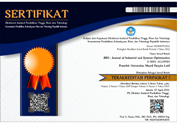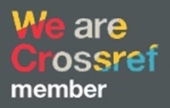MANAJEMEN KINERJA BERBASIS KPI DI PERGURUAN TINGGI: INTEGRASI BALANCED SCORECARD DAN IPMS
DOI:
https://doi.org/10.51804/jiso.v7i1.74-81Keywords:
Balanced Scorecard, Integrated Performance Measurement System, Key Performance Indicators, Perguruan Tinggi, Manajemen KinerjaAbstract
This study explores the application of the Balanced Scorecard (BSC) and Integrated Performance Measurement System (IPMS) in the context of higher education institutions in Indonesia. This approach is used to identify relevant Key Performance Indicators (KPIs) and determine priority weights using the Pairwise Comparison method. The results show that implementing BSC and IPMS can provide a comprehensive performance measurement framework, covering four main perspectives: finance, customer (student and graduate users), internal processes, and learning and growth. The study's findings also show the importance of focusing on human resource development, optimizing operational efficiency, and increasing stakeholder satisfaction as critical factors in achieving the strategic goals of higher education institutions. This study offers practical contributions to improving performance management in higher education institutions. It provides applicable guidance for institution managers in effectively adopting BSC and IPMS approaches.
Penelitian ini bertujuan untuk mengeksplorasi penerapan Balanced Scorecard (BSC) dan Integrated Performance Measurement System (IPMS) dalam konteks institusi pendidikan tinggi di Indonesia. Pendekatan ini digunakan untuk mengidentifikasi Key Performance Indicators (KPI) yang relevan dan menentukan bobot prioritas menggunakan metode Pairwise Comparison. Hasil penelitian menunjukkan bahwa penerapan BSC dan IPMS dapat memberikan kerangka pengukuran kinerja yang komprehensif, mencakup empat perspektif utama: finance/keuangan, customer/pelanggan (mahasiswa dan pengguna lulusan), internal business process/proses internal, serta learning and growth/pembelajaran dan pertumbuhan. Temuan penelitian juga menunjukkan pentingnya fokus pada pengembangan sumber daya manusia (SDM), optimalisasi efisiensi operasional, serta peningkatan kepuasan stakeholder sebagai faktor kunci dalam pencapaian tujuan strategis institusi pendidikan tinggi. Studi ini menawarkan kontribusi praktis dalam meningkatkan manajemen kinerja di institusi pendidikan tinggi serta memberikan panduan yang aplikatif untuk pengelola institusi dalam mengadopsi pendekatan BSC dan IPMS secara efektif.
References
Al-Muhtadi, J., & Tahat, M. (2021). Implementing the balanced scorecard in higher education institutions: Evidence from Jordan. International Journal of Educational Management, 35(6), 1371-1385. https://doi.org/10.1108/IJEM-05-2020-0218
Arifin, Z. (2019). Balanced scorecard in higher education: A literature review. Journal of Applied Research in Higher Education, 11(2), 313-324. https://doi.org/10.1108/JARHE-07-2018-0162
Farooq, M. S., Salam, M., & Rehman, S. U. (2021). Impact of faculty development programs on teaching effectiveness and job satisfaction of higher education faculty members. Journal of Applied Research in Higher Education, 13(2), 450-469. https://doi.org/10.1108/JARHE-06-2020-0158
Fijalkowska, J., & Oliveira, C. (2018). Balanced scorecard in universities. Journal of Intercultural Management, 10(4), 57–83. https://doi.org/10.2478/joim-2018-0025
Gamal, A., & Soemantri, A. I. (2017). The effect of balanced scorecard on the private college performance. Archives of Business Research, 5(5), 126–134. https://doi.org/10.14738/abr.55.2986
Geissdoerfer, M., Savaget, P., Bocken, N. M. P., & Hultink, E. J. (2020). The circular economy – A new sustainability paradigm? Journal of Cleaner Production, 143, 757-768. https://doi.org/10.1016/j.jclepro.2016.12.048
Jaworski, J., & Wo?ny, J. (2015). Conceptual framework for use of balanced scorecard in management of public university. Research Papers of Wroc?aw University of Economics, 398, 189–199. https://doi.org/10.15611/pn.2015.398.15
Kaplan, R. S., & Norton, D. P. (2020). The balanced scorecard: Translating strategy into action. Harvard Business School Press.
Kettunen, J. (2021). A framework for evaluating performance in higher education. Quality Assurance in Education, 29(4), 320-335. https://doi.org/10.1108/QAE-02-2021-0031
Kiriri, P. N. (2019). Management of performance in higher education institutions: The application of the balanced scorecard. European Journal of Education, 1(3), 168–175. https://doi.org/10.26417/ejed.v1i3.p168-175
Lassoued, K. (2018). Balanced scorecard implementation in higher education: An Emirati perspective. Corporate Ownership & Control, 15(3), 205–216. https://doi.org/10.22495/cocv15i3c1p1
Chan, Y. C. (2019). Implementing the balanced scorecard in a university setting: A case study. Journal of Higher Education Management, 34(2).
Ranta, V., Aarikka-Stenroos, L., & Mäkinen, S. J. (2018). Integrated performance measurement systems in educational institutions: A review. Journal of Business Research, 96, 336-349. https://doi.org/10.1016/j.jbusres.2018.04.023
Downloads
Published
Issue
Section
License
Copyright (c) 2024 JISO : Journal of Industrial and Systems Optimization

This work is licensed under a Creative Commons Attribution-ShareAlike 4.0 International License.
With the receipt of the article by JISO Editorial Board and the decision to be published, the copyright regarding the article will be transferred to JISO. The copyright transfer form can be downloaded here.
JISO has the right to multiply and distribute the article and every author is not allowed to publish the same article that was published in this journal.
JISO is licensed under a Creative Commons Attribution-ShareAlike 4.0 International License.
Under the following terms:
Attribution — You must give appropriate credit, provide a link to the license, and indicate if changes were made. You may do so in any reasonable manner, but not in any way that suggests the licensor endorses you or your use.
ShareAlike — If you remix, transform, or build upon the material, you must distribute your contributions under the same license as the original.














